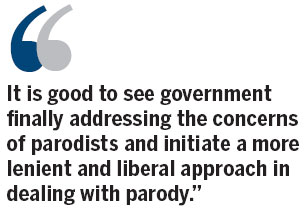Mockery within the law
Updated: 2013-08-22 06:45
By Qiu You(HK Edition)
|
|||||||||
Enough is enough about the public bickering over teacher Lam Wai-sze's controversial verbal abuse of police and the subsequent political standoff. This storm in a teacup has gone too far in whipping up much ado about nothing. For netizens, activists, artists or cartoonists alike, who enjoy making fun of the city's political scene and figures in the form of parody or satire, they are now faced with a more serious and legitimate concern - a proposed copyright law amendment that regulates parodies.
The proposed bill, dubbed by some as the "Article 23 of the Internet", which originally suggested imposing criminal sanctions on parodies, was supposed to be put to final vote at the Legislative Council (LegCo) last summer. Due to public fears it would gag freedom of expression and creativity, as well as all the hindrances by filibusters at that time, the bill was finally shelved for wider consultation later.
Now the controversial issue is back on the agenda and a public consultation has been launched until mid-November as to whether or not parodies should be exempt from legal liability. It is good to see government finally addressing the concerns of parodists and initiate a more lenient and liberal approach in dealing with parody.
Under the watered-down proposal, three options exist. The first is to clarify existing provisions for copyright infringement by saying that only works causing "more than trivial economic prejudice" to the copyright owner would be subject to criminal sanctions. The second option is to introduce a specific criminal exemption for parody so long as the work meets the qualifying conditions, including "not causing more than trivial economic prejudice to the copyright owner". In other words, under these two options, parodists would not be incriminated if their works are not for sale or have not caused considerable economic damage to copyright owners.

The final one is to exempt parodists from civil and criminal liabilities as long as they meet "fair dealing" requirements to be decided by a court on a case-by-case basis. The factors to be considered include the purpose and nature of the work, the degree of similarity with the original work and the impact on the original work's potential market. The existing fair dealing provisions for copyright works - works for the purposes of education, research and private study, criticism and review, as well as news reporting that fall under the exemption - can be applied to the third approach.
The fundamental question is whether there is a need to criminalize parodies when they exceed the copyright limit. With technological advancement, it has become common and popular for netizens, critics, and artists to exchange their views and comments on current events by altering existing copyright works and disseminating them on the Internet. It is undeniable that satire and pastiche have grown into an integral part of our culture, especially online. Not only do they help to cultivate creativity and artistic culture, and add to the city's economic vibrancy and diversity, but they also encourage healthy and liberal public debates on current affairs, prompting the government to be receptive to public opinion.
While netizens or parodists may have fun lampooning the political scene or public figures, the spoofed or the parodied would not be amused. It is important to protect the city's freedom of expression as well as artists' freedom of creation. But it is equally important to safeguard copyright protection and enhance intellectual property development in the city. Some US copyright owners associations recently suggested to the US Trade Representative that Hong Kong should be put under a watch list for allegedly lagging in copyright protection on the Internet. It is therefore essential to strike a balance between freedom of expression and copyright protection.
For parodists, the second and third options are more preferable as they guarantee a copyright exception for parodies that meet certain conditions. However, for the second one, the definition of "more than trivial economic prejudice" is problematic. How to measure economic damage and what amounts to "more than trivial"? Some parodists like to upload their works to YouTube, where they may earn their commissions if a certain hit rate is met. Will this move cause "more than trivial" economic damage to the copyright owner? It will be better if policymakers clarify this meaning and make clear other qualifying conditions.
As to the third option, Hong Kong can draw on the experience of some countries such as Australia and Canada, which have provided a copyright exception for parody and satire within the ambit of "fair dealing". However, their statutes have neither specified how fairness should be assessed nor decided any case for reference. Moreover, there are many decided cases in the US on what is "fair use" of a copyright work despite a case-by-case approach taken by the US court. However, without clear definition on what constitutes "fair dealing", it raises the concern of triggering self-censorship among derivative-works artists in order not to be sued. Some have suggested creating a defense of public interest. The government needs to address their concerns and be open-minded to different opinions that help to perfect this regulatory regime.
The author is a current affairs commentator.
(HK Edition 08/22/2013 page9)